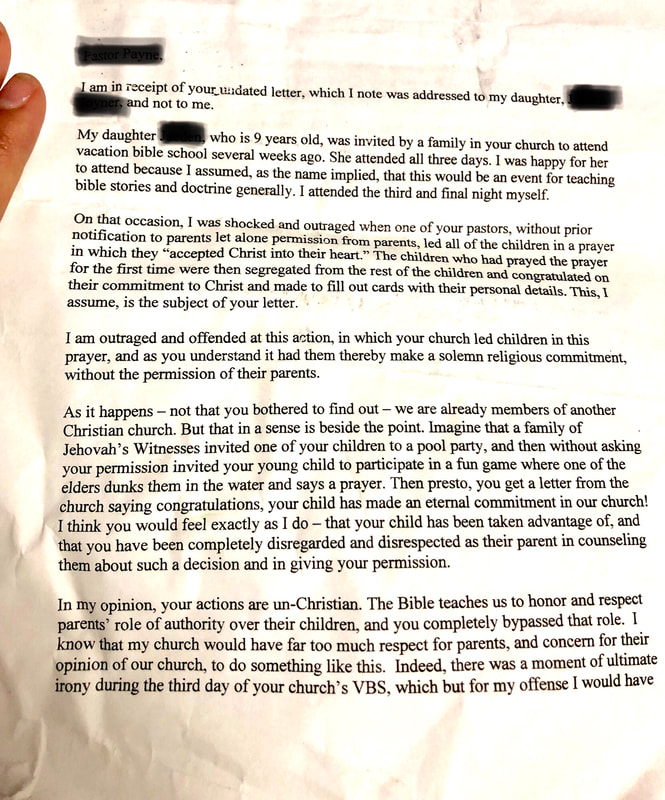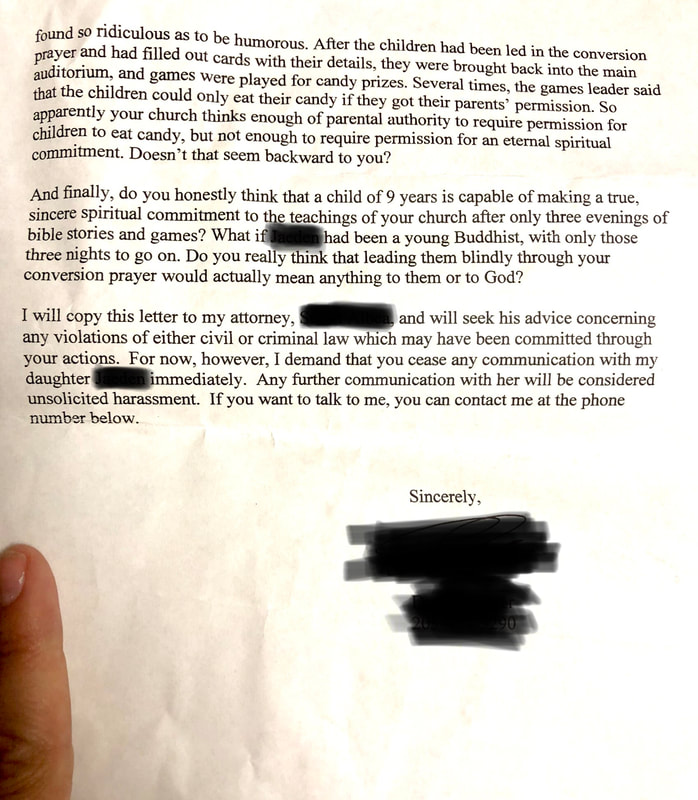|
When you work with kids of any age, you'll always have to make considerations for potty time. It's just a part of life with kids. And in a fallen world where predators are out there, it's important for churches to take safety seriously and have policies in place to be proactive about protecting kids. A megachurch was in the headlines a year ago when one of their preschool volunteers was arrested for molesting young kids in the bathroom at church during their children's ministry time. The church did have bathroom policies, but they weren't being enforced, and it was tragic for at least seven kids.
Many times, bathroom policies can be overlooked in children's ministry, but we have a responsibility to protect the kids in our ministry, and it is vital for a church to have and enforce bathroom policies and procedures every time. The main point of a bathroom policy is this: there should never be an adult alone in a bathroom with kids at any time. Every church has different setups for their bathrooms, and that can make it challenging to know how to deal with different bathroom scenarios, but no matter what your space looks like, you need to have bathroom safety policies. They need to be written down, clear to parents and volunteers, be communicated frequently, and be enforced at all times. Here are some children's ministry bathroom policies and procedures:
I know these seem extreme, but the safety of kids is too important to be lenient in this area. I've created a resource for kidmin leaders that includes an entire volunteer pack (all editable) with a full volunteer handbook and all the policies, as well as volunteer applications, interviews, training guides, evaluations, and more! For a free except from the volunteer handbook, which includes full bathroom and diaper changing policies, click this link. In addition to bathroom policies, it's important for every volunteer to be screened, background checked, and properly trained. Does your church have bathroom policies? Is there anything you would add to the policy?
3 Comments
While many things about the churches I visited were amazing, I wouldn't return, and here's why:
1. Closed Door Classrooms (And No Windows) In one church, I dropped off my three year old at a classroom with a solid door (no window), and a teen volunteer (no other helpers). There was no one to greet me at drop off time or tell me if the classroom was even open and ready to accept kids. I just walked up to a closed door that I couldn't see through. Not only was it not welcoming, but it isn't safe. There should always be an open door (or a window), a half door, some way for others to see into a room. There should never be a situation or time when a volunteer is alone in a closed room with kids, with no accountability or visibility from the outside. This is not only to protect the kids, but also to protect volunteers against accusations. Solution: Install dutch doors (leave the top half open); baby gates, station volunteers at the open door, or see-through windows. A camera in every classroom adds another level of security (I've been in a church with multiple situations where we needed to watch video footage of specific incidents that happened during class). 2. One Volunteer Alone (Or No Volunteers) In another church, I dropped my one year old toddler girl off in a nursery with one man (who wasn't identified as a volunteer in any visible way) and a closed door with no window, and no other helpers or volunteers. Then I dropped my three year old son off in a large room with a few other elementary aged kids, and no children's ministry volunteers. One of the church's parking lot greeters told me he would stay with all the kids until the children's ministry volunteer (who I had never met, as it was my first time visiting the church) arrived. I wasn't given a registration form or asked to give them any information about myself or my kids. *In most circumstances, a volunteer should not be alone in a room with kids. Some churches I know do allow a volunteer alone in a room if no other helper is available, as long as a door is open, and a hallway volunteer is available if needed for emergencies. While I don't recommend this, and I probably wouldn't feel safe as a parent leaving my kid alone in a room with only one volunteer, there may be circumstances in which churches can make this call. Your church's insurance can also give you details on whether or not they have requirements about volunteers in rooms based on liability. There is never a time when it is ok for a volunteer to be alone in a bathroom with kids. (My next post will dive into how to write a bathroom policy for your children's ministry.) Solution: A minimum of two un-related volunteers in every classroom. All children's ministry volunteers should be screened, background checked, should be asked to fill out an application, and trained. While serving, they need to be identified in some way as volunteers (name tag, sticker, lanyard, T-shirt, etc.). 3. No Check-in System (Or a Check-in System Not Enforced) I didn't feel comfortable leaving my kids at a children's ministry with no registration form for first time guests to collect information about the kids, and no check-in system to make sure my kids are picked up by the correct person. One church I visited did have a check-in system, and we were given stickers, but even though it was our first time and the volunteers didn't know me, no one asked to see my pick-up ticket when I went to two classrooms to pick up my kids after the service. Solution: Even if your church can't afford a computer check-in system, you can use pre-printed stickers with spaces for parents' and kids' names and information, or you could use matching bracelets, lanyards, or tags. If you're looking for a great electronic check-in system, I recommend the Kidmin App. If you have a check-in system and it's not enforced, it's pointless. Make sure your volunteers are asking to see the pick-up tag from every parent (even those they know), and really looking at the tag to make sure they match. 4. No Way to Get Ahold of Parents When I'm visiting a church for the first time and drop my kids off in the children's ministry, I want to know the church has a way to get ahold of me if I'm needed during the service or an emergency occurs. Solution: A great way to do this is by using numbers up on the screen (if your church uses a screen) for each family, since they will be looking up at the screen during the service (hopefully). You can buy LED boards where you can post numbers, or post them through your worship software (ProPresenter has this option). You could also use pagers. Some churches use text message or phone calls, although some parents may not look at their phones during the service. ________________________________________________________________________________________ I understand being on a tight budget and not having many volunteers, but these are things we cannot get wrong as children's ministry leaders. These are four things we need to plan for, prepare for, and train volunteers for every time we have kids (not just with new guests). If you miss these things, not only is there a great risk for kids and volunteers, but parents who are first time guests (or regulars) may not feel comfortable and may not be able to focus on the service, and may not ever return to your church. In one of the churches I visited, I got up during the worship to go check on my kids in the children's ministry, because I was so uncomfortable and couldn't focus on worship. There are areas we all fall short in children's ministry, but safety is a non-negotiable. These are some safety policies your church needs to consistently get right:
If you don't have and enforce safety policies, not only is there huge liability (lawsuits) for your church, but more importantly, there is a great risk for kids. You can have the best children's ministry curriculum, the best stage and set decor, and the most fun games and prizes, but if kids aren't safe and parents aren't comfortable, they won't stay at your church. Keeping kids safe lays the foundation for you to minister to entire families. As a parent, I know how my kids are the most precious thing in the world to me, and when I take them to a church, I'm entrusting that church to protect them and care for them. There are many dangers in this world, and while we can't prevent every possible thing from going wrong, children's ministries have a duty to intentionally be proactive about protecting kids as much as possible. What other things does your church do to be proactive about keeping kids safe? Is there anything you would add to this list? I remember standing in the middle of a crowd of kids who had totally gone off track, looking at my one other leader in the room with a look of desperation and dread. I had lost the kids. A few kids were sitting quietly doing their craft, but everyone else was running wild. Popsicle sticks being thrown, crayons dumped everywhere, kids taking each other's crafts and running away with them, while other kids just ran around yelling. The service had gone long, and we stretched craft time a few extra minutes as we waited for parents to arrive. I finally took a deep breath and yelled out over the kids as loud as I could and told them to stop and sit, and wait for their parents in silence. Then I proceeded to lecture them on the importance of listening and following the rules.
I went home after that service feeling worn down and discouraged. This wasn't the first time a service had gone that way. But was it really the kids' fault? Was there something I could improve as a children's ministry leader to get them to listen and behave better, so they could actually get something out of the service, and have fun at the same time? I learned the answer to that question: YES. There is a lot we can do as children's ministry leaders to stop discipline issues before they ever start. WHY WE DISCIPLINE Before talking about discipline, it's important to know the why behind it: we can't teach kids about God if we don't have their attention. We won't have their attention if there are behavior issues with no correction or discipline. God tells us He disciplines us to shape us and make us more like Him. That should be our goal: to model Christlike behavior and help kids become more like Him in everything we do. Hebrews 12:10-11 says, "God disciplines us for our good, in order that we may share in his holiness. No discipline seems pleasant at the time, but painful. Later on, however, it produces a harvest of righteousness and peace for those who have been trained by it." Our goal is not to have kids who behave a certain way, but who have a relationship with Christ. Discipline isn't about punishments, rules, and negativity. It's about guidance, correction, diligence, and teaching. It will help kids develop self-control, responsibility, character, and help shape them to become more like Christ. It will enable them to learn about Him and experience Him so they can hav e a relationship with Him. It has to start from love and a desire to disciple kids. 1. WRITE IT DOWN It's important to have a discipline policy, rather than just winging it. It allows you to have consistency in how you deal with different situations and empowers your teachers and leaders to deal with situations on their own, knowing it will all be consistent. Write a discipline policy, and keep it simple. Put it in your volunteer handbook, post your rules on your walls or on your screens. If you don't have a discipline policy that is consistent across the board, you also risk having some teachers who can be too strict, and some who can be too lenient. A discipline policy helps get everyone on the same page. Your discipline policy should be no more than 3-5 points, with clear and concise boundaries and steps to take. In addition to steps for correction, it's helpful to have 3-5 simple rules that kids can remember, and that encompass all the positive behaviors you want to see, but also include the steps for correction in your discipline policy. An example of rules you could use:
An example of a Discipline Policy:
Give a copy of your discipline policy to your leaders, and talk with them about different scenarios and how to handle them. This would make a great Pre-Service huddle training session that you could do in ten minutes as you're meeting with your team. You can provide behavior logs for your volunteers to write down instances of behavior issues. This is helpful if you have multiple services or rotating volunteers, so you can keep a log of specific incidents. If you see a pattern with a specific child, you can make a note to talk with the parents. 2. KEEP IT SIMPLE Keep your rules simple, and your discipline steps simple. You don't need 20 steps for teachers to remember or 10 rules for kids. Repeat your classroom rules often. Make sure they are simple enough for kids to remember and understand. 3. USE A REWARD SYSTEM You can utilize a reward system (this works great with elementary aged kids). It's especially effective to split the kids into teams and use something they can see, such as clear containers with plastic balls (or just using laundry baskets with balloons). You could do sticker charts, individual "tokens" or "Bucks" they can use at a prize store. Let kids earn rewards for participation, listening, and following rules. It's only effective if you actually do give the rewards consistently. You can take away an item if one of the teams isn't listening. You could give out prizes at the end of the service for the winning team, or you could just let the winning team win, and let them dance around and cheer. 4. TALK TO PARENTS Whenever you see a pattern of behavior issues, or a child acts in a violent way, it's important to talk with parents right away. Make sure your conversation is filled with gentleness, grace, kindness, and lots of encouragement. It's important to let the parents know you care about their child and you want to help them get the most out of the service. Ask them for ideas about how to help their child. You may ask them to sit in the service and observe or help if their child needs extra help. Show them your rules and your discipline policy, and give them specifics about how their child behaved. *A tip: make sure you're not ONLY talking to parents when there are behavior issues: look for any opportunity you can to tell them how amazing their kid is or something great their kid did during a service. 5. BE PROACTIVE
Don't give up on the kids who need extra help. I've seen kids go from the worst behaved kid in the entire children's ministry to the best behaved, and most helpful leader, with the right encouragement and an adult who believes in them. There are no bad kids. Sometimes the kids who are disruptive are going through issues we don't know about, and are acting out and need extra love and grace. Every time you discipline a child, it's an opportunity to point them to God and remind them of His love and forgiveness for us. Let this be your driving force in your children's ministry discipline. The one thing we always need more of in children's ministry is volunteers. But would you know what to do with 20 new volunteers if they indicated an interest in serving next week? Would you have a place and a plan for them? Would you know how to train train them and find the sweet spot for them in your ministry? One of the biggest mistakes we make in children's ministry (and I'm raising my own hand too) is neglecting to follow up with and have a plan for interested volunteers. We let high quality people slip through our fingers because we aren't prepared ahead of time and don't have a plan in place. Here's a simple six step plan for on-boarding new volunteers.
The whole on-boarding process should take between 4-8 weeks (including a 4 week training period) for people to go from interested to completely assimilated on the team. 1. Get prepared for them. Write job simple, but detailed descriptions and job titles for every role you need in your children's ministry. Even roles you aren't even close to filling. Make a simple chart or list of every possible volunteer you wish to have on your team. Leave blank spaces where there are no people currently serving. Write down your plan for on-boarding and assimilating them. 2. Follow up within 24 hours. This is an easy one, and yet, the one we miss too often. Any time you talk with someone about serving, or they indicate an interest in serving, follow up right away with a quick email or call inviting them to talk more (the interview). Give them information about the volunteer roles that are available. Clear communication is key in moving volunteers to the next step. 3. Interview them and get to know them. The interview can be a 15 minute chat before or after church or a coffee meeting during the week. It doesn't need to be serious or intense -- just get to know them! Ask about their personal lives and hobbies, their church involvement, and their spiritual life. It's a time to get to know them and their interests, gifts, passions, and experience. You should be able to determine the right fit for them after getting to know them, but if not, you can give them a few options and try them to see which would be the best fit. Be careful not to place them in a spot that isn't the right fit just because you have a need there. 4. Get a background check and application. Have them fill out an application and background check form. Once they're cleared to serve, move them immediately to step 5. 5. Train them. Give them a handbook and details about the ministry and job expectations. Hands-on training with your best leaders is more effective than any other type of training. I recommend four weeks of hands-on training with a specific trainer (an experienced team member who will consistently show up for four weeks in a row to demonstrate and model the ministry role). The first week: let them only observe experienced volunteers (choose your best for this!). The second week, give them the information about policies, procedures, expectations, schedules, curriculum, and all the information they need to serve in the role. Let them observe again without any responsibility. The third week, have them lead a small part of the service alongside experienced volunteers, with encouragement and feedback. The fourth week: allow them to lead with the assistance and observation of their trainer. Give them feedback, tips, and lots of positive encouragement. Some volunteers will feel comfortable leading and jumping in at four weeks, and others will need more time before they're ready to lead on their own. 6. Evaluate and check back in. After a new volunteer starts serving, don't forget about them forever! Check back in within 90 days of their start date and ask how they're feeling about it. Ask if they want to try any other roles. Give them positive feedback and ask for their feedback about the ministry role they're serving in. They may be ready for more responsibility in the ministry. If you've been in children's ministry for any amount of time, you know the feeling of dread that comes over you on Saturday night when you see an email or text message come through . . . then another one, and another. Sometimes it happens early on Sunday mornings. Sometimes you won't be contacted at all when a volunteer doesn't show up. This is one of the most difficult (and frustrating) parts of children's ministry. Children's ministry needs more volunteers than any other ministry in the church, and also needs the most specialized and trained volunteers, and we often don't have any choice to but to run the ministry anyway, even with key volunteers missing. Imagine if your church couldn't run a worship service without 1 volunteer for every 6 adults in the sanctuary on Sunday mornings! Leading a kidmin is hard!
If we don't build in solutions to the problem of volunteers calling off at the last minute (which I define as anything within five days of the service), it will hurt the ministry and can even lead to frustrations and burning out as a children's ministry leader. Here are some things you can do: 1. Have a back-up plan and a sub-system. You can schedule floaters/subs for every Sunday, or have them on stand-by. You could also ask a whole adult Sunday school class or small group if the group could be an "on-call group" where you could ask any of them to serve if you get in a bind. Keep in mind you would need to train and background check any subs you plan to use. Know and communicate your plan in advance. *Don't abuse this, but you could also ask other staff members or ministry leaders (or their spouses/family members, or some of their key volunteers) if they would be willing to step in if you get in a bind, and you can repay the favor for them if they need a last minute volunteer to step in (be sure to repay the favor if you do this). 2. Have people find their own replacements. You could have a list of volunteers who can't commit to serving regularly, but would be willing to be on a sub list or on-call list, and give that list of phone numbers out to all volunteers, and ask them to find their own subs. You could use a group message feature like a group text chat, a GroupMe account, a facebook page, or any volunteer scheduling app, and let people ask others to switch with them or cover for them. 3. Overstaff your rooms and schedule floaters. When you have plenty of volunteers scheduled each week, even if some don't show up, you'll still have enough people to run the ministry. If everyone DOES show up (has this ever happened?!), the load will be spread and it will run even more smoothly. You may need to combine classes or combine small groups, but as long as you're within safe ratios of volunteers to kids, you can still run your ministry. 4. Hold them accountable. When someone calls off at the last minute, they need to know you're aware and you care. The first time it happens, you can call/email/text them and let them know you missed them. They may have a great reason for calling off or not showing up, and iit may be an opportunity to show empathy and minister to them. If it happens again, talk with them in person and ask if there's anything you can do to help them or if they can still commit to serving. If it happens again after that, be gentle but firm, and ask if serving in children's ministry is something they can still commit to, or if they want to move to a new role (maybe a sub?) or take a break. 5. Check yourself and your leadership. Are you communicating with volunteers clearly? Do they know when they are scheduled to serve/are you reminding them and asking them to confirm they are coming? Do they feel needed and valued when they're serving? Have you cast the vision for the importance of what they are doing? Are they in the right role? Is it a good experience for them when they DO show up to serve? When volunteers know how important their presence is, and feel valued and have ownership and investment in the ministry, they are not likely to bail at the last minute. Create a culture where people want to serve, feel valued, and have ownership. Many people think working in a church would be the perfect work scenario - where everyone always gets along in perfect harmony and loves and supports each other. Unfortunately, this doesn't always happen. I've worked for some amazing bosses, and I've worked in toxic work environments. I've had bosses who encouraged, inspired and supported me. And I've had bosses who I felt didn't respect, trust, or support me. And I've learned and grown from every situation.
One of the main things to look for in a church you're considering joining as a children's ministry leader is the simply this: a lead pastor who is a healthy leader, supportive, and empowering. It doesn't matter what the children's ministry is like, because you can handle any issue in the children's ministry if you have a solid leader behind you. And when it comes to church and staff culture: healthy starts at the top and flows down (the same is true for toxic culture). When you're leading a children's ministry and you don't feel supported by your boss or lead pastor, it can be discouraging and deflating. But what can you do in that situation?
If you've done all these things, and you still feel unsupported and feel you're not respected by your boss, it may be time to move on. No matter how awesome the children's ministry is, if you're not supported by your lead pastor or boss, it's just a matter of time before something blows up, and it's very hard to win in ministry without your boss behind you.  I was a children's pastor for over a decade before I became a parent. I had insecurities that people would think I couldn't lead kids well, and couldn't lead parents or give them advice. I sometimes heard comments insinuating I couldn't fully understand what it's like to lead kids spiritually, since I didn't have kids of my own. I wondered if I was qualified to lead, empower and support parents as spiritual leaders, and lead their kids. But I also had a lot of encouraging people I got to serve with who supported and taught me a lot. I truly do believe non-parents can be amazing children's ministry leaders. But if I could go back and give advice to myself as a kidmin leader in my pre-parent days, here are a few things I would tell myself . . . 1. Don’t make judgements – about crying babies, or kids who throw tantrums, or parents’ decisions. It's easy to see a child throwing a tantrum in the nursery and think "Gosh, that parent must never leave their kid. Maybe if they came to church more regularly, their baby wouldn't cry like that," or see a three year old disobeying and think "Maybe if they disciplined more, their three year old wouldn't do that." Or see a parent ignore a behavior you think should be disciplined. As a parent, I know my ten month old who comes to church every week could go into the nursery happily one week, and crying the next, or my three year old could have a meltdown because he's tired, or I could choose to "pick my battles." Parents already feel guilt and anxiety over many things. We don't need judgements-- we need empathy, understanding and support. 2. Take safety and security as seriously as possible (and bend the other rules a little more). The number one thing parents want from a children's ministry is to know their kids are safe. They want the volunteers to ask for the pick-up sticker at pick-up time, to always enforce bathroom safety policies, to not allow random adults in the room with the kids, and to background check every volunteer. But some of the "non-safety" related policies can slide a little, and that's ok. If a children's ministry doesn't allow toys from home in the classroom, and my three year old is having one of those days when he'll have a meltdown if he has to be without his Lightning McQueen car, I want a kidmin leader who will say "That's ok, bring it in with you!" There were times in the past when I held so tightly to non-essential policies and refused to make exceptions, when a little flexibility would have been totally fine. The only policies you shouldn't ever bend on are the safety ones; all the others can be a little flexible if needed. 3. Give grace to parents. Give grace to the parents who walk in 25 minutes late to the service. Welcome them and don't make them feel it's an inconvenience that they're late or that you're judging them. I've learned that even if you're ready to leave the house on time, you could have a diaper blowout, or a meltdown as you're getting your toddler dressed, or a lost shoe, or any number of things out of your control as a parent. Give grace to parents who forget to label the sippy cup or send a change of clothes for a potty accident. Go the extra mile and be prepared with extra labels and extra clothes so the parents don't have to feel bad if they forget something. I've been that parent whose sippy cup wasn't labeled or whose child had a potty accident with no change of clothes. Give them grace, and not grief. I've had circumstances as a non-parent children's pastor where I felt like parents overreacted or became irrational about issues relating to their kids, and I've also been the irrational parent who overreacted about an issue with my kid. There's an internal "mama bear" protective instinct that causes us to overreact sometimes. Don't judge; just show patience and grace. 4. Don't make life harder than it needs to be. Getting to church with two young kids is hard enough. As a parent, I appreciate when a church's parking lot and drop-off is easy to navigate, when I don't have to look hard to find answers to my questions or figure out where my kids go, when the check-in and check-out process is easy and seamless. Requiring too much of parents is a big mistake. One time I handed out pieces of paper to all the elementary parents and asked them to keep track of something with their kids every day for a month, and bring it back in at the end of the month. No one did it. You know why? That's too much for parents; there are too many other things to keep track of and think about. Don't ask them to be at too many events or place too many expectations on parents. Families are busy. Children's ministry shouldn't make life harder. 5. Teach the volunteers how to communicate with parents. No parent wants to hear "Your kid was bad today" when they pick their kid up from church. Communicating about behavior issues is a sensitive topic, and should be done with gentleness and encouragement. This will take a lot of training and reminding for some volunteers, but it's very important. It's also important to remind volunteers to tell parents good things about the kids. Every parent loves hearing how awesome their kid is: even better if it's something specific, such as an example of how their kid was kind or how passionate their kid was in worship. Parents love people who love their kids. 6. Every single child is the most important thing in the world to their parents: treat all the kids that way. There's nothing more important in a parent's life than their child, and they want to know their child will be comforted, given attention and love, and treated fairly. Every kid (even the annoying one) is valuable and special because they are made by God and loved by Him. I don't think having two young kids of my own has made me a better children's ministry leader, but it has made me more aware of some things. If you're leading a children's ministry and you're not a parent, I believe it is absolutely possible to be an awesome minister, shepherd, spiritual leader, and advisor to kids and parents. Parents can learn a lot from non-parent kidmin leaders, and kidmin leaders can learn from parents. We're partners, and we're working together to help kids grow in their faith and know Christ. I had just come into my office on Monday morning after a long weekend of children's ministry and a big outreach event for families on Saturday. The event had gone well, and had taken lots of volunteers and planning, and I was exhausted, but in a good way. I sat down to my computer and opened my email, only to see an email from a volunteer come in. The title of the email was the name of the event. The email said that while the event was fun and a lot of people came, I needed to be aware the way we did prizes didn't work, the volunteers should have been organized differently, and the follow-up for new families wasn't done well. My heart immediately sank, and I felt myself getting defensive. I wanted to respond back with reasons why those weren't valid points or why we had done things the way we had, and I also wanted to say "Well if you think you can run the event better- YOU run it!" But the Lord stopped me (thankfully). I decided not to respond right away while I thought over the feedback. If you've been in children's ministry any time at all, you've likely gotten your share of "feedback" from well-meaning people who have all kinds of ideas for how you should be doing things. Especially as a young leader, I was NOT good at handling criticism. Whether it was about the events, the way I ran the ministry, or even criticism about a piece of work I had created, I found myself getting upset and defensive, even crying and arguing with people. Over the years, God has taught me a lot about how to handle criticism. Here are some things I've learned: 1. Think of criticism as feedback. When I started thinking of criticism as feedback instead of criticism, I recognized it could help me grow, rather than just discourage me. I learned not to take it personally, even if it feels personal. If the person giving the feedback is someone I trust and have a relationship with, I give them the benefit of the doubt and believe they're coming from a place of wanting to help, instead of wanting to tear me down. This is much easier said than done, but we cannot take criticism personally. We have to separate ourselves from the events and programming we lead. Just because something could have been done better, doesn't mean we are a failure. 2. Learn from it. Even if some of the criticism is actually not valid, there is almost always something we can learn from and grow from. The parts that aren't valid-- just ignore them and delete them. Especially anonymous criticism. 3. Embrace it and welcome it. It takes a truly secure, humble, and mature leader to ASK for criticism, welcome it, and embrace it. I'm still not good at welcoming criticism, but recognizing our weaknesses and places we can grow and improve makes us better leaders. Other people have different perspectives, and we can learn from them. Now, especially after large events, it's important to do a debriefing and evaluation or feedback survey. Give people and opportunity to respond with their feedback, and accept it all. Many times people will even be happy to have their opinions heard, even if you don't do everything they want you to do. 4. Accept that you can't please everyone. Being in children's ministry is especially challenging, because you have four groups of people to consider in everything you do: the kids, the volunteers, the parents, and your church team/leadership. Each of those groups is filled with people with different opinions and expectations. You can't make everyone happy all the time. There could be twenty different opinions about how something should be done. As someone who wants everyone to be happy all the time, this has been an especially difficult truth for me to accept. We might have people who disagree with us or don't like a decision, and that's okay. A mature leader can foster healthy relationships and respect even with those who disagree. The biggest thing I've learned about criticism is not to get defensive when someone gives negative feedback or criticism. Look for the truth, learn from the feedback, and move forward. Don't get stuck in it or replay it in your head. Oftentimes, we may hear ten good comments about something, but it's the one negative remark that sticks with us. This is a stronghold the enemy uses to make us doubt ourselves. Every leader receives criticism. The good leaders have just learned how to embrace it, learn from it, and move forward. So how did I respond to that email from the beginning? Even though my first instinct was to get upset and defensive, after taking some time to think about it and waiting before I responded, I thanked the person for the feedback, then I wrote it down and decided to make some real changes in the ministry because of the feedback. After that, I started issuing feedback surveys to all volunteers after every event, and I started welcoming feedback and constructive criticism. I started inviting people who disagree with me to come into conversations and share their opinions, because I learned it only helps me grow. If you can only hear the opinions of those who agree with you all the time, you will miss many opportunities for growth as a leader. The other day, I heard my three year old son playing with his toys, saying "For God so loved the world, He sent His one and only son" to his toys. My heart melted. He had about ten Scripture verses memorized before he even turned three. He loves learning and saying his verses, and I love knowing he has God's Word in his heart, before he can even read.
My son isn't scared of much (he's almost TOO fearless!), but one thing he is scared of is shadows on the wall. I have one particular vase of flowers that makes a shadow that scares him, and the other day, I ask him if God can help him when he's scared. He said "Be strong and courageous; do not be afraid, God will be there wherever you go." That was the first time God brought a Bible verse to his heart to remind him of His truths! And he's three years old! Teaching kids to memorize Scripture is important, because if they have God's Word in their heart, then they can remember that God loves them, God gives them strength and courage, they can trust God, and they can internalize those truths. A mistake I've seen when teaching Bible verses to kids is giving them verses that are too long/difficult for their age, and teaching them too many at one time without repetition. Kids are like sponges! They are better at memorizing things than even adults. But if we don't repeat and reinforce what they know, it can get lost. My strategy for teaching kids memory verses is to keep it simple, and it's a strategy I've developed over the past 10+ years. I have come up with a list of verses that are age-appropriate for elementary and preschool kids, and we teach one verse a month for preschool kids, and two a month for elementary kids. When we learn a new verse each month, we go over all the previous month's verses. We talk about what the verses mean and how they show us who God is and how we can live. These memory verse cards are the perfect way to teach kids memory verses every month! I laminated them and punched holes in them to make a little flip book, which my son loves to look at. You can make them into flash cards or put magnet tape on the back to make magnets for the fridge! This product is all downloadable and customizable, and includes:
CLICK HERE to buy this product. It's the middle of summer, and we're in the thick of VBS season! It's one of my favorite times of the year! For kidmin leaders, we know that means lots of fun with kids, volunteers . . . and parents! I've had the opportunity to have lots of interactions with many parents over the years in children's ministry, but as I reflect on all my VBSes in the past, one particular interaction stands out. I got this letter in the mail (the actual "snail mail") over a 13 years ago after VBS, when I was in the beginning of my children's ministry career. I was young, inexperienced, hurt, and outraged when I read it. This was from a dad who sent his daughter to a VBS at a church in the Bible Belt in the South . . . and was then surprised when she participated in a salvation altar call, and felt it warranted a call to his attorney (perhaps a scare tactic; it never happened)?! But as I read the letter now, a few years further in my ministry journey, and as a parent myself, I read it with different eyes.  When I read the letter now, I see the many ways I failed as a leader and failed to build trust with parents. It may have been a bit of an overreaction (or maybe not!), but parents are extra protective of the most precious things in the entire world to them: their kids. And rightfully so. I understand it.
This post isn't about whether or not altar calls for salvation are appropriate for kids (my views on that have changed over the years too), but on the mistakes I made as a children's ministry leader in engaging with parents. I'm thankful to have had the opportunity to learn from these mistakes, and that's why I've kept this letter over the years. What have I learned? What mistakes did I make? MISTAKE #1 Leave the parents out of their kids' spiritual milestones. Whether or not your church practices altar/salvation calls for kids, and whether or not the parents are involved in your children's ministry, you can include parents and build bridges with parents when it comes to their kids' spiritual development and faith milestones. As someone who grew up with parents who weren't believers, I know what a powerful experience it was for my family when my youth pastor as a teenager built a strong relationship with my parents, and even invited them to church for my baptism! That intentionality spoke volumes to my parents as a witness for the grace and love of Christ. For parents who ARE believers, when we try to take the role away from them or take their place in spiritual development and milestones for their kids, without including them, we rob them of the opportunity and calling God has given them as spiritual leaders in their kids' lives. The dad in this letter was rightfully upset when he noticed that we gave out candy in VBS and told the kids to wait and ask their parents before eating it, but then prayed with them for an eternal spiritual decision without even considering their parents—ouch! Even if parents are not part of your church or are not believers, you can build relationships and build trust with them. You can include them in spiritual milestones. You can give them resources and ways to support and encourage them as parents, no matter what stage of parenting they're in. MISTAKE #2 Communicate with kids instead of parents. After this letter, I made a new policy that when I send mail to kids, that is not sealed and not private. I send emails and letters to parents. When communicating directly with kids, I use a postcard). I think sending kids postcards in the mail to let them know you missed them or appreciate them can be impactful, but I also think we need to carefully consider our communication families, and include the parents whenever possible. MISTAKE #3 Don't give parents details and information. The dad in this letter didn't know our church or our leaders, didn't know what our VBS program would teach and entail, and didn't know about the salvation opportunities that would be presented. While it's not possible to communicate every single detail with every parent, and you will likely (hopefully!) have kids attend VBS who don't go to your church, we CAN give parents an easy way to get details. You can send a brief email, text, newsletter, or take home paper each day of VBS letting parents know what their kids are learning or doing that day. You can use a website for VBS registration that included details about your program and church. Especially if your church is targeting kids and families for VBS who aren't already a part of your church, make sure you have an easy way for them to get information about your church, your VBS program, and what to expect. I've seen churches include parents in an opening ceremony or closing ceremony for VBS. One year, I swapped a regular VBS and did a three night Family VBS where whole families attended together, and they loved it! A simple explanation of safety policies and procedures (whether a poster, a one-on-one conversation, a brochure, or a blurb on your website or registration site) can let parents know what your church does to keep their kids safe. WHAT CAN WE DO BETTER? MAKE VBS EASY AND EFFECTIVE FOR FAMILIES As a mother of two young kids, I totally understand how difficult it can be just to get out the door and get the kids to church. The best way a church can serve parents is by not making it more complicated and difficult than it needs to be. VBS registration should be easy and uncomplicated (make sure it's easy to find on your website, and send emails with info!); parking should be easy to figure out (and not too far away from the church); check-in should be fast and smooth, and not too hard to figure out. It should be easy to know where to go and how to pick your kids up. Having extra labels for kids' items is helpful. The check-out process should also be smooth, effective, and safe. If a parent can pick up their kids without any kind of pick-up tag, or there's no way to match the pick-up tag to the kids they are picking up, parents won't feel that their kids are safe. Make sure your volunteers actually enforce the pick-up procedures. I've taken my kids to 5 different VBSes in my town and only 2 of them actually utilized a safe and secure check-out process. SPEAK POSITIVELY With many VBS parents, we only get a 30 second interaction with them, and that's during drop-off and pick-up. That's the chance for the greeters, small group leaders, and check-out volunteers to make an impression and let them know you care for their family and their child. One time, I heard a young, well-meaning preschool volunteer say to a parents (in front of a crowded hallway with all their friends around) "Man!! Your kid was wild and bad today! He was crazy!!" I saw the look on the poor parents' faces and how their faces sank and how embarrassed they looked, and it broke my heart. Even if we have to speak with parents about behavior issues, these conversations need to happen in private, and need to be filled with grace, compassion, and love. The best things to say to a parent during pick up time are words of affirmation and love for their kid, and something specific about how awesome their kid is would be even better! Remind your leaders to look for opportunities to let parents know how awesome their kids and to look for specific positive things to share with parents. LOVE THEIR KIDS I know someone whose daughter has a wonderful Sunday school teacher who goes out of her way to show care for the kids in her class. The volunteer goes to the kids' performances and takes them a special treat during their school lunch time (with parents' permission). It means the world to the little girl, but it means even more to the parents that another adult cares so much for their daughter and is walking with them in helping her know the Lord. Another volunteer spent a day in the hospital sitting with a boy in his small group's family while the boy was sick. He prayed with the parents and was simply available for them. I know how special it is when my kids are excited to see their favorite leaders at church, and when those leaders are excited to see my kids, it impacts me. Parents love people who love their kids. I'm thankful for an awesome church I get to be a part of right now, and for the leaders who pour into my kids every week. Over the years I've been in children's ministry leadership, I've had the opportunity to grow in my leadership and learn from my mistakes so I can become a better and more influential leader. I'm grateful for the grace from others to learn from mistakes. Before I became a parent, I joked that the kids were the easy part of children's ministry; the parents were the difficult part! But now I understand that children's ministry and parents should be the strongest allies and partners, because we're both working toward the same goal: helping kids know Christ. |
Children are a Gift Lynne Howardkidmin leader, mother, and servant of the Lord. These are the views of Lynne Howard, and are not necessarily the views and opinions of David C Cook or any church. Archives
April 2023
Categories
All
|









 RSS Feed
RSS Feed